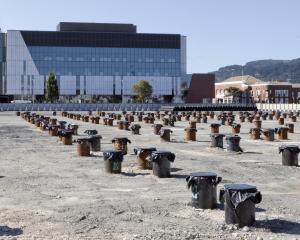A chorus of approval has greeted the refusal of a Dunedin judge to allow a student to escape conviction for couch burning.
In this, we join the fire service and police in endorsing firm action.
As Fire Service East Otago area commander Laurence Voight said: ''Just because they are students doesn't absolve them from being accountable for their actions.''
Judge Kevin Phillips, in the Dunedin District Court last Wednesday, convicted Adam James Landers (21) for recklessly damaging a couch on March 17.
Landers had sought a discharge without conviction but that was refused by the judge, who also ordered him to pay $750 reparations.
Between February and July this year, the fire service attended 62 nuisance fires in the student quarter of North Dunedin.
That was down on the 88 for the same period last year but still far too many.
The key in such a sentence is deterrence.
Hopefully, along with university disciplinary measures, students will get the message that lighting reckless fires is unacceptable and there will be serious consequences.
The fires need to be stomped out not just because they are a nuisance but because they can be dangerous.
It would not take much for a student flat to go up in flames.
Interestingly, University of Otago proctor Simon Thompson - who also supported the court's stance - said one positive trend was an increasing intolerance from students themselves to fire-lighting.
It was often students who reported fires to Campus Watch.
The university itself has not been afraid to suspend students for semesters for serious misbehaviour, and word will spread among students about the severity of the responses.
The message must be emphasised that while it's fine to have fun it is definitely not on to behave in destructive or illegal ways.
As well as the deterrent factor, Landers' sentence reflects society's view of such misdemeanors.
That is part of the role of the courts, and Judge Phillips in sentencing, said community leaders, including the mayor, had urged there be urgent action to curb the behaviour.
This particular case, it should be noted, appears worse than some because, according to the police summary, Landers and associates had entered the flat uninvited and the flat's occupants were seriously against the fire being lit.
Landers, it should be said, did plead guilty, had made a donation to charity, had completed 19 hours' voluntary community work and had $750 available for reparations.
The judge noted Landers wanted to work as a planner and become a member of the New Zealand Institute of Surveyors but there was no evidence a conviction would be a barrier to his intended career.
The difficulty here is the implication he might well have been treated differently in other circumstances.
If you can establish your career is at risk, are you much more likely to be discharged, albeit with other penalties?
That is the tricky balancing act.
The deterrence must be effective and consistency is important.
But judges still have to take individual circumstances into account.
Every case is dissimilar in some way or another, and the consequences of conviction can be very different.
This, naturally, raises the issue of discharges - or name suppressions - for prominent sportsmen or entertainers.
Judges have to be cognisant that they, like students, should not be treated as special cases.
While, of course, they are likely to receive far more publicity than most defendants, they, too, have to be accountable for their actions.
Judges, too, have to be sceptical and questioning when defence counsel say convictions will prevent their clients from entering their chosen profession or travelling to certain countries.
Such claims must be established.
While Landers, who has also been suspended from the university for a semester, could feel hard done by and like a scapegoat, punishment is not - and should not be - too harsh.
He has the opportunity to come back, resume his studies, overcome a youthful black mark and pursue a successful career.
Given an otherwise good record, a wise employer should be able to see past one drunken student escapade that Landers will no doubt be regretting sorely.












